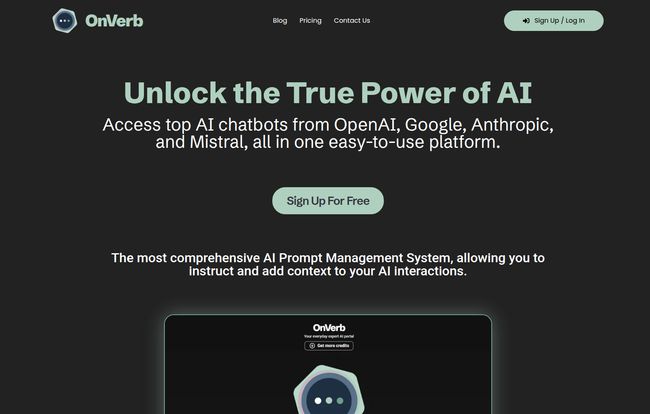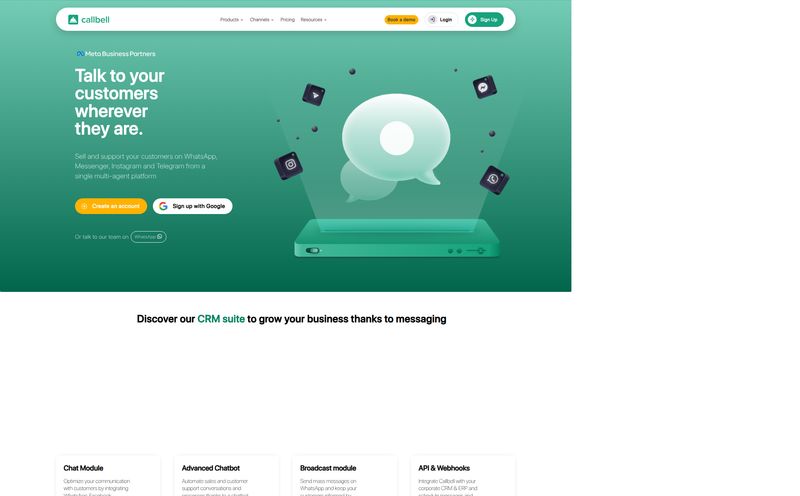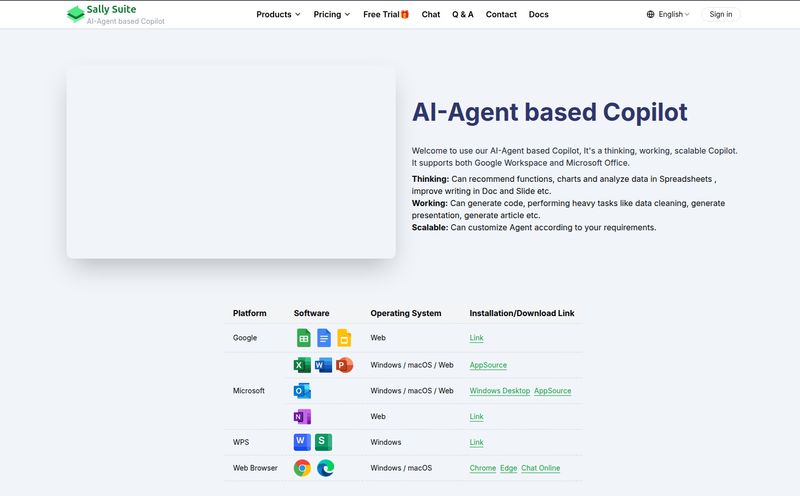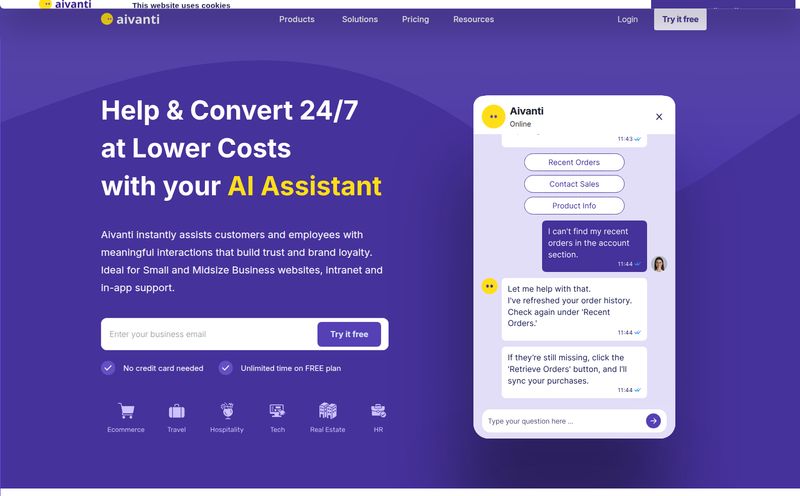We've all been there. You ask an AI to write something for you—a blog post, an email, a social media caption—and what you get back is… fine. It's okay. It’s the definition of generic. It has all the personality of a beige wall. You spend the next half hour tweaking and editing, trying to inject some life into it, and you start to wonder if it would have been faster to just write the dang thing yourself.
It’s the single biggest frustration for anyone trying to use AI for serious content creation. You know the power is there, but getting the AI to consistently stay on-brand, adopt a specific tone, or remember instructions from one chat to the next feels like herding cats. Digital, very intelligent, but frustratingly amnesiac cats.
For months, my solution was a chaotic mess of text files and sticky notes filled with my “perfect prompts.” It wasn’t pretty. Then I stumbled upon a tool called OnVerb, which is built around solving this exact problem. It’s an AI prompt management system, and after playing around with it for a while, I have some thoughts. Lots of them.
So, What Exactly is OnVerb?
Think of OnVerb as a central command center for your AI interactions. Instead of just opening up a plain chat window, OnVerb gives you a structured environment to talk to some of the biggest AI models out there—we’re talking OpenAI’s GPT series, Anthropic’s Claude, Google’s models, and Mistral AI. But here’s the kicker, and the whole reason it exists: system prompts.
OnVerb lets you create, save, and manage detailed instructions that the AI has to follow for your entire conversation. It’s like giving your new employee a super-detailed job description and onboarding packet before they even start their first task. The AI always has that context. No more reminding it to be witty or to write for a B2B audience in every single message.

Visit OnVerb
The Sheer Magic of System Prompts
I can’t overstate how much of a difference this makes. A system prompt is the secret sauce. It’s the background programming that turns a generalist AI into your specialist assistant. You set the stage once, and the AI performs its role beautifully.
Let me give you a practical example from my own workflow. I needed some ideas for an article about CPC trends.
My old way (without a system prompt): I’d type, "Give me 5 blog post ideas about CPC trends." I'd get back something like "1. What is CPC? 2. How to Lower Your CPC. 3. Top CPC Trends in 2024." You know, the usual boring stuff.
My new way (with an OnVerb system prompt):First, I set up a system prompt that says:
You are 'Marko,' a seasoned PPC strategist with a decade of experience. You're known for your contrarian, data-backed takes. You speak directly to in-house marketers who are tired of fluff. Your tone is confident and a little bit snarky. Avoid basic definitions and focus on actionable, surprising insights.
Then, I just type: "Give me 5 blog post ideas." The difference is night and day. The ideas are sharper, the angles are more interesting, and the output already has the voice I need. It saves an incredible amount of time and mental energy.
A Few OnVerb Features I'm Genuinely Liking
Beyond the core function, a few things have stood out to me as I’ve used the platform.
A Multi-Model Playground
I’ve always felt that different AI models have different strengths. GPT-4o is a creative powerhouse, but sometimes Claude 3 Sonnet gives me a more structured, logical analysis. OnVerb puts them all in one place. I can run the same prompt through different models with a click of a button to see which one “gets” my request the best. It’s like A/B testing your AI assistants, which is a bit of a nerd-out moment for me, I'll admit.
The Prompt Management System is a Lifesaver
This is huge. My old 'prompts.txt' file was a source of shame. Now, I have a clean, organized library of my best system prompts inside OnVerb. I have one for writing SEO-focused articles, one for crafting punchy email subject lines, and another for acting as a coding assistant. I can label them, put them in folders, and call them up whenever I need them. It turns my past successes into a reusable toolkit. This alone is almost worth the price of admission.
They Seem to Care About Privacy
In our line of work, we sometimes handle client information or proprietary marketing strategies. The idea of feeding that into a public AI model can be… unsettling. OnVerb makes a point of highlighting their security, mentioning that data is handled with HTTPS/SSL encryption. It provides a little extra peace of mind that my brilliant (and sometimes sensitive) prompts aren't just floating out in the ether.
Let's Talk Money: OnVerb Pricing
Alright, the all-important question: what does it cost? OnVerb has a tiered subscription model based on “Chat Credits.” It's a pretty common setup for these kinds of platforms. Essentially, different actions and different models consume credits at different rates, with the more powerful models costing more per use.
Here’s a quick breakdown of their plans:
| Plan | Price (Monthly) | Key Features |
|---|---|---|
| Starter Plan | $19.99 | 1,000 Chat Credits/month, access to all integrated models, prompt management. |
| Growth Plan | $39.99 | 2,500 Chat Credits/month, all Starter features, plus priority email support. |
| Business Plan | $69.99 | 4,500 Chat Credits/month, all Growth features. |
My take? The Starter Plan at $19.99 is a solid entry point for freelancers, bloggers, or small businesses. It gives you enough credits to really get a feel for the workflow and see if it makes a difference for you. The best part is they offer a 7-day free trial, so you can test drive the whole thing without reaching for your wallet. I always appreciate a try-before-you-buy approach.
The Not-So-Perfect Bits (Because Nothing Is)
Okay, it’s not all sunshine and perfectly prompted rainbows. There are a few things you should be aware of.
- The Credit System. I get why it exists, but it does mean you have to be conscious of your usage, especially when using the top-tier models like GPT-4. If you're a super heavy user, you might find yourself needing to buy add-on credits.
- Web App Only. As of right now, there’s no dedicated mobile app. For me, this isn’t a huge issue since I do 99% of my work on a laptop. But if you’re someone who loves to work on a tablet or phone, that's a limitation to consider.
- The Tool is Only as Good as You Are. This is the most important one. OnVerb is not a magic wand. It gives you the framework to create amazing prompts, but you still have to have the skill to write them. There's a learning curve to prompt engineering. It simply gives you a much better place to practice and perfect that skill.
My Final Take: Who Should Use OnVerb?
So, what’s the bottom line? OnVerb is a fantastic tool for a specific type of person. I’d say it’s a near-perfect fit for:
- Content Creators and Marketers: Anyone who needs to produce consistent, on-brand content will find the system prompts to be a complete game-changer.
- SEOs and PPC Specialists: For generating meta descriptions, ad copy, keyword ideas, or content briefs at scale, it's brilliant.
- Developers and Hobbyists: Having a persistent “You are an expert Python coder” prompt is way better than reminding the AI of its role every five minutes.
- Small Agencies: Managing different client voices and tones becomes much, much easier.
Who is it not for? If you're just a casual user who wants to ask an AI for a recipe or settle a bet with a friend, it’s probably overkill. But for any professional who sees AI as a core part of their toolkit, OnVerb brings a much-needed layer of control and sophistication.
Frequently Asked Questions About OnVerb
What exactly is a system prompt?
A system prompt is a set of instructions you give to an AI model at the very beginning of a conversation. It defines the AI's persona, tone, rules, and context. OnVerb allows you to save and reuse these prompts so the AI always acts the way you want it to, without you having to repeat the instructions in every message.
Which AI models can I use with OnVerb?
OnVerb provides access to a wide range of models from leading AI labs, including OpenAI (like GPT-3.5 Turbo and GPT-4o), Anthropic (like Claude Haiku and Instant), Google, and Mistral AI. This lets you choose the best model for your specific task.
Is OnVerb free to use?
OnVerb is a premium, subscription-based service. However, they offer a 7-day free trial that gives you full access to the platform's features so you can see if it's a good fit for your needs before committing to a paid plan.
Is my data and my prompts safe with OnVerb?
OnVerb states that they take security seriously. They use HTTPS/SSL encryption for all data transfers, which is the standard for securing communications over a computer network. This helps protect the privacy of your prompts and conversations.
Can I save my best prompts for later?
Yes! This is one of the core features. OnVerb has a prompt management system that allows you to create, save, and organize your system prompts into folders. You can easily access and reuse your most effective prompts for future chats.
What happens if I run out of chat credits?
If you use up your monthly chat credits, you have the option to purchase add-on credit packs to continue using the service until your credits reset at the start of the next billing cycle. The plans are designed to provide a certain amount of usage, but power users might need to top up.
Time to Stop Yelling at Your AI
Look, the age of AI is here, and fighting it is a losing battle. The real skill is learning how to work with it effectively. Tools like OnVerb are a massive step in the right direction. It's about moving from a chaotic, unpredictable relationship with AI to a controlled, productive partnership. For me, it has brought a sense of order to the creative chaos, and I'm producing better, more consistent content because of it.
If you're tired of getting bland, generic output from your AI assistant, give the OnVerb trial a spin. See what happens when you're the one holding the playbook. You might be surprised at how well your AI can actually listen.



